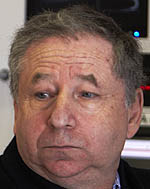- Home
-
News
-
Latest News
- Williams reveals 2026 livery
- Aston Martin was months behind rivals, admits Newey
- Audi has a "very, very long list" of things to fix
- Haas signs Doohan to reserve role
- Antonelli: The title is the target
- Russell eyes title fight with Verstappen
- "Get your s**t together," Wolff warns rivals
- Mercedes officially launches its 2026 contender
- "I have unfinished business in F1," insists Horner
- More News
-
-
Drivers
-
Current Drivers
- Lando Norris
- Max Verstappen
- Gabriel Bortoleto
- Isack Hadjar
- Pierre Gasly
- Sergio Perez
- Andrea Kimi Antonelli
- Fernando Alonso
- Charles Leclerc
- Lance Stroll
- Alexander Albon
- Nico Hulkenberg
- Liam Lawson
- Esteban Ocon
- Arvid Lindblad
- Franco Colapinto
- Lewis Hamilton
- Carlos Sainz
- George Russell
- Valtteri Bottas
- Oscar Piastri
- Oliver Bearman
- Test/Reserve Drivers
-
-
Teams
-
Current Teams
- McLaren Formula 1 Team
- Mercedes-AMG Petronas Formula One Team
- Oracle Red Bull Racing
- Scuderia Ferrari HP
- Atlassian Williams F1 Team
- Visa Cash App Racing Bulls Formula One Team
- Aston Martin Aramco Formula F1 Team
- TGR Haas F1 Team
- Audi Revolut F1 Team
- BWT Alpine F1 Team
- Cadillac Formula 1 Team
-
-
Tracks
-
Current Circuits
- Melbourne (Australia)
- Shanghai (China)
- Suzuka (Japan)
- Sakhir (Bahrain)
- Jeddah (Saudi Arabia)
- Miami (USA)
- Montreal (Canada)
- Monaco (Monaco)
- Barcelona (Spain)
- Red Bull Ring (Austria)
- Silverstone (UK)
- Spa-Francorchamps (Belgium)
- Budapest (Hungary)
- Zandvoort (Netherlands)
- Monza (Italy)
- Madring (Spain)
- Baku (Azerbaijan)
- Singapore (Singapore)
- Austin (USA)
- Mexico City (Mexico)
- Interlagos (Brazil)
- Las Vegas (USA)
- Losail (Qatar)
- Abu Dhabi (UAE)
-
- Seasons
-
Pictures
-
Latest Galleries
- 2026 Launch - Williams FW48
- 2026 Barcelona Shakedown 30 January
- 2026 Barcelona Shakedown 29 January
- 2026 Barcelona Shakedown 28 January
- 2026 Barcelona Shakedown 27 January
- 2026 Barcelona Shakedown 26 January
- 2026 Launch - Red Bull RB22
- 2026 Launch - Ferrari SF-26
- 2026 Launch - Mercedes W17
- 2026 Launch - Audi R26
-
Gallery Categories
- 2026 Season
- F1 Testing
- 2025 Season
- All galleries
-
- Stats
- JOHNNYBET

 There has been a lot of talk about cost-cutting in Formula One over the past week. On Tuesday Ferrari president Luca di Montezemolo urged F1 to cut costs in the wake of the economic crisis sweeping across Europe. "The world economic situation and that of Europe is very serious and F1 cannot ignore the fact," he said adding "we need to tackle urgently, and with determination, the question of costs." This was followed by a statement on Friday from the World Motor Sport Council (WMSC) which said that F1's governing body the FIA "is having active discussions with teams regarding cost control...The intention is to help all teams participate in the Championship in a fair and equal manner."
There has been a lot of talk about cost-cutting in Formula One over the past week. On Tuesday Ferrari president Luca di Montezemolo urged F1 to cut costs in the wake of the economic crisis sweeping across Europe. "The world economic situation and that of Europe is very serious and F1 cannot ignore the fact," he said adding "we need to tackle urgently, and with determination, the question of costs." This was followed by a statement on Friday from the World Motor Sport Council (WMSC) which said that F1's governing body the FIA "is having active discussions with teams regarding cost control...The intention is to help all teams participate in the Championship in a fair and equal manner." 



















sign in